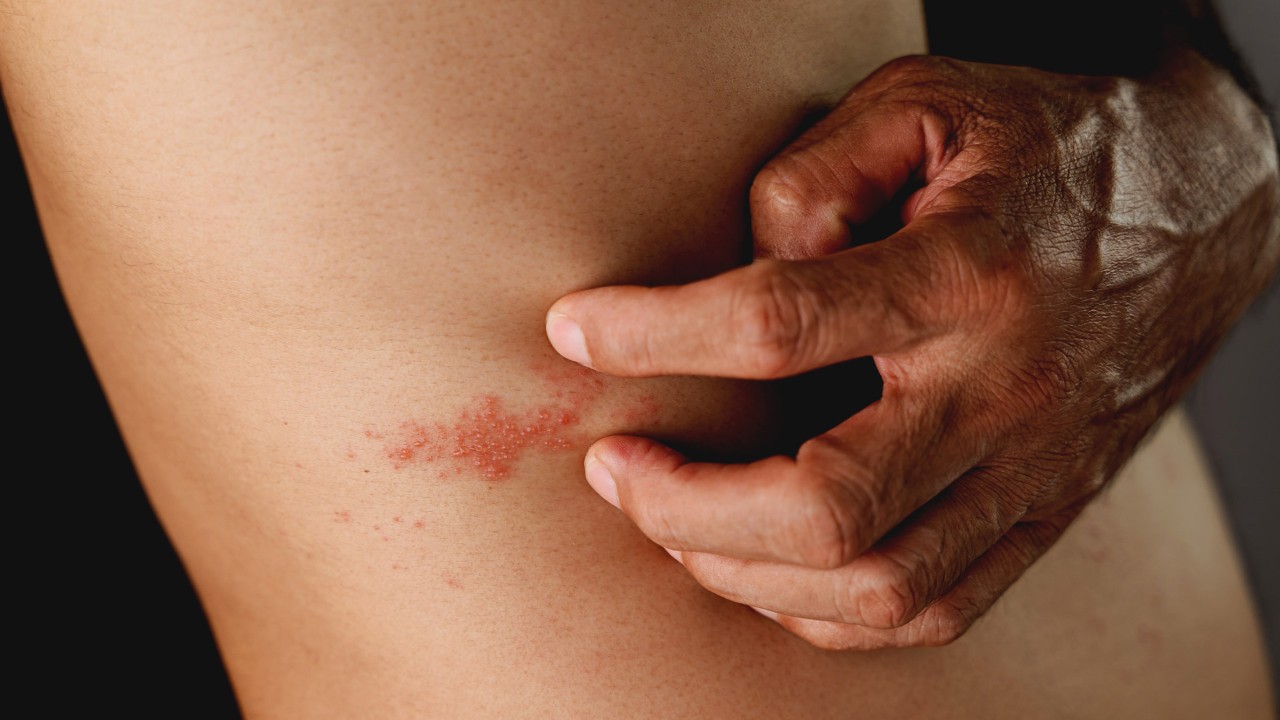What you need to know about shingles
Shingles is a common disease, but it isn’t always diagnosed straight away. Symptoms range from generally feeling unwell to painful rashes.

The symptoms of shingles, also known as herpes zoster, develop gradually. They often start with a general feeling of being unwell, accompanies by a headache and aching limbs as well as a slightly elevated body temperature.
In addition to these general symptoms, it can also cause a stinging or burning sensation on the skin along with tingling or itching in a particular area. “Typical shingles symptoms begin after two to five days: a burning or stinging, moderate to severe pain in the affected skin area, followed by strip-like reddening of the skin and fluid-filled blisters,” says Filip Wilczek, a doctor at the Sanacare practice in Zurich.
The blisters are often filled with a clear or milky liquid. The characteristic rash forms along one or two dermatomes, depending on which nerve the virus spreads from, and typically in a belt-like pattern.
Video: how dangerous is shingles?
What happens when I have shingles?
Herpes zoster can cause severe pain along the affected nerve, which can have a serious impact on daily life. The pain can be so intense that it limits mobility and makes even simple things like getting dressed or touching your skin unbearable. Other symptoms such as fever, fatigue and hypersensitivity or discomfort of the skin may also occur.
In severe cases, shingles can lead to complications such as post-herpetic neuralgia, which causes a burning pain in the nerves and skin that lasts months or even years after the rash and blisters of shingles go away. “Complications have to be taken seriously, but they are rare with shingles,” says Filip Wilczek. That’s why it’s important to seek medical advice to track the progression of the disease.
How contagious is shingles?
Shingles is caused by the varicella-zoster virus (VZV), the same virus that causes chickenpox. “To develop shingles, you have to have had chickenpox previously,” explains Wilczek. As over 95% of adults in Switzerland have had chickenpox as a child, the varicella-zoster virus stays dormant in the body even though the symptoms have long since disappeared.
Although this virus doesn’t cause a new chickenpox infection, it can cause shingles at a later stage in life. Around one in three adults will be affected by shingles at some point in their life, usually in later years.
Shingles is less contagious than the highly contagious chickenpox, but the virus can still be transmitted easily when the shingles rash is in the blister phase. So it’s important to cover the blisters and avoid direct contact to stop the virus from spreading.
At what age can you get shingles?
Around 20,000 cases of shingles are recorded in Switzerland every year, with people over the age of 50 being the most affected. People with weakened immune systems or certain medical conditions are also at increased risk.
Children can also get shingles if they have previously had chickenpox. However, the risk is lower than in older adults. The symptoms and treatment options are similar to those in adults, although the disease is often milder in children.
A vaccination is also available against herpes zoster – but according to Wilczek, this is only recommended for older people and patients at risk.
Treatment for shingles
Treatment of shingles should be started as soon as possible, ideally within 72 hours of the appearance of changes to the skin. Shingles is usually treated with antiviral drugs to reduce the duration and severity of the disease. Painkillers can be used to ease the symptoms.
Early treatment can help avoid complications and improve the course of the disease. Medical supervision is recommended in all cases, even with milder forms of the disease.
-
How can I aid the healing process myself?
There are various measures you can take to alleviate the symptoms of herpes zoster and support the healing process. Painkillers such as ibuprofen or paracetamol can be taken to manage the pain. Wearing loose clothing can also help minimise rubbing at the infected areas and ease the discomfort.
Applying cooling ointments or lotions to the affected areas of skin can also help to relieve pain and itching. “Zinc creams, for example, help to dry out the blisters and minimise the risk of inflammation,” says Wilczek. This allows the skin to heal with as few scars as possible.
-
Can shingles be treated without medication?
In some cases, herpes zoster can be treated without medication, especially if the symptoms are mild and there are no complications. However, antiviral drugs such as acyclovir, valaciclovir or famciclovir are usually prescribed to reduce the duration and severity of the disease and minimise the likelihood of possible complications. These drugs inhibit the replication of the varicella zoster virus and can therefore shorten the course of shingles.
Stages of shingles
The course of shingles can vary, but the disease tends to clear up within two to four weeks. “You may be contagious during this time, so good hygiene is important, for example, you should use separate towels at home,” says Wilczek. Shingles is usually harmless and leaves no lasting damage.
Complications can occur in rare cases, including post-herpetic neuralgia, which causes a lasting pain along the affected nerve that can remain long after the rash has disappeared. Timely treatment with antiviral medication can reduce the risk of complications and improve the course of herpes zoster.
How dangerous is shingles during pregnancy?
Herpes zoster can pose a particular risk during pregnancy, as it can endanger the unborn child and cause miscarriage or malformations. Careful medical care is essential to minimise the potential risks for mother and child. Women who contract shingles during pregnancy should consult a doctor immediately in order to receive the best possible treatment and prevent possible complications.